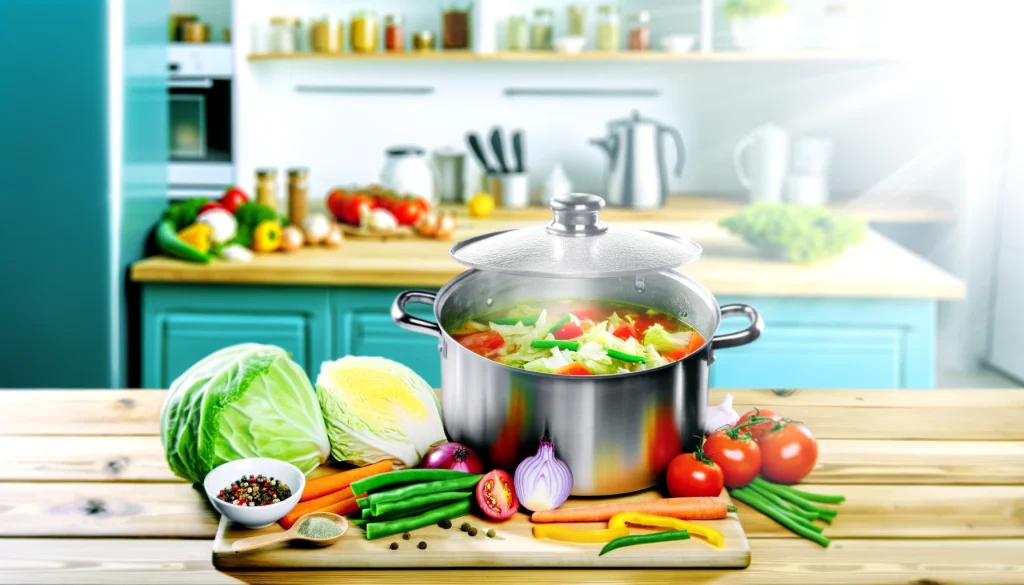As an Amazon Associate I earn from qualifying purchases.
In a world where quick fixes and fad diets abound, the allure of a “fat-burning” cabbage soup recipe stands out as a beacon of hope for those seeking to shed unwanted pounds. With its promise of rapid weight loss and simplicity of ingredients, this humble soup has captured the imagination of many on their journey towards a healthier lifestyle. But what lies behind the hype, and can a simple bowl of soup truly hold the key to fat loss?
In this article, we delve into the world of fat-burning cabbage soup recipes, exploring their origins, ingredients, and purported benefits. From its humble beginnings to its status as a dieting phenomenon, we’ll uncover the truth behind the cabbage soup craze and whether it lives up to its reputation as a weight loss miracle. So, grab a ladle and join us as we uncover the secrets of this beloved soup and its potential to help you achieve your health and wellness goals.
Fat Burning Cabbage Soup Recipe

Fat-burning cabbage soup is a popular choice for those looking to kickstart a weight loss journey or simply incorporate more vegetables into their diet. While no single food can truly “burn fat” on its own, a diet rich in vegetables and low in calories, like this cabbage soup, can help you reduce your overall calorie intake and support weight loss as part of a balanced diet. Here’s a simple and delicious recipe to try:
Ingredients:
- 1 large head of cabbage, chopped
- 2 large onions, chopped
- 2 bell peppers, any color, chopped
- 4-5 carrots, peeled and sliced
- 4-5 stalks of celery, chopped
- 1-2 cans of diced tomatoes (14.5 oz each), undrained
- 6-8 cups of vegetable broth or water (adjust based on desired soup thickness)
- 3 cloves of garlic, minced
- 1 teaspoon smoked paprika
- 1 teaspoon cayenne pepper (adjust to taste)
- Salt and pepper to taste
- 2 tablespoons tomato paste (optional for richer flavor)
- Fresh herbs like parsley or cilantro for garnish (optional)
- Juice of 1 lemon (optional, for added zest)
Instructions:
- Prepare the Vegetables: Rinse all the vegetables under cold water. Chop the cabbage, onions, bell peppers, carrots, and celery into bite-sized pieces.
- Sauté Onions and Garlic: In a large pot, heat a little water or vegetable broth over medium heat. Add the onions and garlic, sautéing until they become translucent. This step helps to build the flavor base for the soup.
- Add the Vegetables: Add the chopped carrots, celery, and bell peppers to the pot. Stir for a few minutes until they start to soften slightly.
- Add Remaining Ingredients: Add the chopped cabbage, diced tomatoes with their juice, vegetable broth (or water), smoked paprika, cayenne pepper, and tomato paste (if using). Stir well to combine all the ingredients.
- Simmer the Soup: Bring the mixture to a boil, then reduce the heat to low. Cover and let the soup simmer for about 30-45 minutes, or until all the vegetables are tender to your liking.
- Season and Serve: Once the vegetables are cooked, season the soup with salt and pepper to taste. Add the lemon juice if using. Serve hot, garnished with fresh parsley or cilantro if desired.
Tips for the Best Cabbage Soup:
- Adjust the Spices: Feel free to adjust the amount of smoked paprika and cayenne pepper according to your taste preferences. You can also add other herbs and spices like thyme, oregano, or basil for variety.
- Add Protein: For a more filling meal, consider adding beans, lentils, or shredded chicken to the soup.
- Make it Your Own: Don’t hesitate to add or substitute other vegetables based on what you have available. Zucchini, spinach, and mushrooms can also make great additions to this soup.
Remember, while this soup can be a healthy and low-calorie meal option, it’s essential to maintain a balanced diet that includes a variety of foods to ensure you’re getting all the necessary nutrients. Enjoy this soup as part of your overall healthy eating plan!
Expert Tips
The concept of a “fat-burning” cabbage soup as a means to lose weight quickly has been popularized by various diet plans over the years. While no food can directly cause fat loss, cabbage soup can be a low-calorie and nutritious addition to a well-balanced diet. Here are some expert tips to make your cabbage soup not only healthy but also delicious and satisfying:
1. Maximize Flavor Without Extra Calories
- Use a variety of spices: Boost the flavor without adding calories by using herbs and spices like cayenne pepper, black pepper, garlic, and onions. These ingredients add depth to the soup and can also offer metabolism-boosting properties.
- Roast vegetables: Before adding them to your soup, consider roasting some of the vegetables like onions, garlic, and even cabbage itself. This can enhance their natural sweetness and add a smoky depth to the soup’s flavor profile.
2. Incorporate Protein
- While traditional cabbage soup recipes might focus on vegetables, adding a lean protein source can make the soup more filling and nutritionally balanced. Consider including chicken breast, tofu, or beans. Protein is essential for muscle repair and can also help you feel satiated for longer periods.
3. Choose Low-Sodium Options
- Many cabbage soup recipes include broth or canned vegetables that can be high in sodium. Opt for low-sodium or no-salt-added broth and canned goods to keep your soup heart-healthy.
4. Add a Variety of Vegetables
- Beyond cabbage, incorporate a rainbow of vegetables to get a variety of nutrients. Carrots, bell peppers, tomatoes, spinach, and zucchini all make great additions. The more colorful your soup, the broader the range of antioxidants and vitamins you’ll consume.
5. Consider Healthy Fats
- Adding a small amount of healthy fats can increase the absorption of fat-soluble vitamins found in vegetables. Drizzle a teaspoon of olive oil into your bowl of soup or sauté the vegetables in it before adding them to the pot. Avocado slices also make a great garnish and add healthy fats.
6. Mind Your Portions
- Even though cabbage soup is low in calories, it’s essential to listen to your body’s hunger and fullness cues. Enjoy your soup as part of a balanced diet that includes a variety of foods.
7. Stay Hydrated
- Soup can contribute to your daily fluid intake, but it’s still important to drink plenty of water throughout the day, especially if you’re increasing your fiber intake with a vegetable-rich soup.
8. Serve with a Complex Carb
- To make a more balanced meal, consider serving your cabbage soup with a side of whole grains like brown rice, quinoa, or whole-grain bread. This will help make the meal more satisfying and provide you with sustained energy.
Remember, while cabbage soup can be a healthy and tasty part of your diet, it’s most effective for weight loss when consumed as part of a balanced diet that includes a variety of foods. Always consult with a healthcare professional or a dietitian before starting any extreme diet or weight loss plan.
Why This Recipe Is Just So Good…
The “fat-burning” cabbage soup recipe is considered beneficial for several reasons, making it a popular choice for those looking to manage their weight or incorporate more vegetables into their diet. Here’s why this recipe is often regarded as beneficial:
1. Low in Calories
- Cabbage is low in calories but high in fiber, making it a filling ingredient that can help you feel satisfied without consuming excess calories. This soup is often promoted as a low-calorie option for those seeking to reduce their calorie intake for weight loss.
2. Nutrient-Dense
- Cabbage and other vegetables used in this soup, such as onions, carrots, and tomatoes, are rich in vitamins, minerals, and antioxidants. By including a variety of vegetables, this soup provides a wide range of nutrients essential for overall health and well-being.
3. High in Fiber
- The combination of vegetables in this soup provides a significant amount of dietary fiber, which can aid in digestion, promote satiety, and support weight management goals by helping you feel full for longer periods.
4. Hydration
- Soups, including cabbage soup, are hydrating and can contribute to your daily fluid intake. Staying hydrated is essential for overall health and can support weight loss efforts by promoting proper digestion and metabolism.
5. Versatile and Customizable
- This recipe is highly adaptable, allowing you to customize it based on your preferences and dietary needs. You can adjust the ingredients, spices, and seasonings to suit your taste, making it a versatile option for any meal.
6. Easy to Prepare
- Cabbage soup is typically simple and quick to prepare, requiring minimal cooking skills or equipment. It can be made in large batches and stored for several days, making it a convenient option for busy individuals or families.
7. Promotes Vegetable Consumption
- Incorporating cabbage soup into your diet encourages the consumption of a variety of vegetables, which are essential for overall health. By enjoying this soup regularly, you can increase your intake of nutrient-rich vegetables and promote a balanced diet.
8. Satisfying and Comforting
- Cabbage soup is not only nutritious but also comforting and satisfying, especially during colder months. The warmth and heartiness of the soup can help curb cravings and provide a sense of comfort and well-being.
Overall, the “fat-burning” cabbage soup recipe is considered beneficial due to its low-calorie, nutrient-dense nature, versatility, ease of preparation, and satisfying qualities. While it’s not a magical solution for weight loss, incorporating this soup into a balanced diet can be a healthy addition for those looking to manage their weight and increase their vegetable intake.
Storage Instructions
Storing your cabbage soup properly is key to maintaining its freshness and nutritional value. Here are some storage instructions to ensure your soup stays as delicious and nutritious as when it was first made:
Refrigeration
- Cool Down: Allow the soup to cool to room temperature before storing. Do not leave it out for more than 2 hours to avoid bacterial growth.
- Airtight Containers: Transfer the soup into airtight containers. Glass containers are preferable for health reasons and can help keep the soup fresh longer.
- Refrigerate: Store the soup in the refrigerator. Properly stored, cabbage soup can last for 3-4 days.
Freezing
- Portion Control: If you plan to freeze the soup, consider portioning it into individual servings. This makes it easier to thaw only what you need for a meal, reducing waste.
- Proper Containers: Use freezer-safe containers or bags. Leave some space at the top of containers as the soup will expand when frozen.
- Labeling: Label the containers with the date of freezing. Properly frozen, cabbage soup can last for 2-3 months without significant loss of flavor or texture.
- Thawing: Thaw the soup in the refrigerator overnight when you’re ready to eat it. Alternatively, you can directly reheat frozen soup over the stove on low heat, stirring frequently to prevent sticking.
Reheating
- Stovetop: Reheat the soup in a pot over medium heat until it’s hot all the way through. Stir occasionally to ensure even heating.
- Microwave: For a quicker option, reheat portions of soup in a microwave-safe container. Cover the container with a microwave-safe lid or paper towel to avoid splatters. Heat on high for a few minutes, stirring halfway through to ensure even heating.
Additional Tips
- Avoid Repeated Reheating: Reheat only the amount of soup you plan to eat at one time. Repeatedly warming and cooling the soup can degrade its quality and increase the risk of foodborne illness.
- Check for Spoilage: Before reheating or consuming, always check for signs of spoilage, such as an off smell or mold. If in doubt, it’s safer to discard the soup.
By following these storage instructions, you can enjoy your cabbage soup while minimizing waste and ensuring that each serving is as delicious and nutritious as possible.
Frequently Asked Questions (FAQ)
Q: Is cabbage soup really effective for weight loss?
A: Cabbage soup is often used as part of a short-term weight loss plan due to its low calorie and high fiber content. While it can help reduce calorie intake and promote satiety, it’s not a magic solution for weight loss. Sustainable weight loss requires a balanced diet and lifestyle changes.
Q: How often can I eat cabbage soup on a fat-burning diet?
A: Cabbage soup can be consumed as part of a fat-burning diet, but it’s essential to include a variety of foods to meet your nutritional needs. While some diets suggest eating cabbage soup exclusively for several days, it’s generally recommended to incorporate it alongside other healthy foods.
Q: Can I modify the cabbage soup recipe to suit my dietary preferences?
A: Yes, the cabbage soup recipe is highly customizable. You can adjust the ingredients, spices, and seasonings to suit your taste preferences and dietary restrictions. Adding protein sources like chicken or beans can enhance its nutritional value and make it more satisfying.
Q: Can I consume cabbage soup if I have digestive issues?
A: Cabbage and other cruciferous vegetables in the soup may cause digestive discomfort, such as gas or bloating, in some individuals, especially if consumed in large quantities. If you have digestive issues, it’s best to consume cabbage soup in moderation and monitor your body’s response.
Q: How long can I store cabbage soup in the refrigerator?
A: Cabbage soup can be stored in the refrigerator for 3-4 days in an airtight container. Make sure to cool the soup completely before refrigerating it to prevent bacterial growth. Reheat it thoroughly before consuming.
Q: Can I freeze cabbage soup for later use?
A: Yes, cabbage soup can be frozen for future use. Allow the soup to cool completely before transferring it to freezer-safe containers or bags. It can be stored in the freezer for 2-3 months. Thaw it in the refrigerator overnight before reheating.
Q: Is cabbage soup suitable for a vegan or vegetarian diet?
A: Yes, cabbage soup can be adapted to fit vegan or vegetarian dietary preferences. Simply use vegetable broth and omit any animal products like meat or dairy. You can also add plant-based protein sources like tofu or legumes.
Q: Can I drink other beverages while on a cabbage soup diet?
A: While on a cabbage soup diet, it’s essential to stay hydrated by drinking plenty of water throughout the day. Avoid sugary beverages and alcohol, as they can add unnecessary calories and interfere with weight loss goals. Unsweetened herbal tea or infused water can be enjoyed as alternatives.
Q: Is cabbage soup really effective for burning fat?
A: Cabbage soup is often promoted as a “fat-burning” food due to its low calorie and high fiber content. While it can be a nutritious addition to a balanced diet, there’s no scientific evidence to suggest that cabbage soup alone directly burns fat. However, including it as part of a calorie-controlled diet may support weight loss by promoting feelings of fullness and reducing overall calorie intake.
Q: Can I eat cabbage soup every day to lose weight?
A: While cabbage soup can be part of a healthy eating plan, relying solely on cabbage soup for an extended period is not recommended. It’s important to consume a variety of foods to ensure you’re meeting your nutritional needs. Additionally, long-term restrictive diets are often unsustainable and may lead to nutrient deficiencies or other health issues.
Q: What makes cabbage soup “fat-burning”?
A: Cabbage soup is often referred to as “fat-burning” because it is low in calories and high in fiber. The high fiber content can help you feel full and satisfied while consuming fewer calories, potentially aiding in weight loss. Additionally, cabbage and other vegetables used in the soup are low in energy density, meaning they provide fewer calories per gram, which can support weight management.
Q: Can I customize the fat-burning cabbage soup recipe to suit my dietary preferences?
A: Absolutely! The beauty of cabbage soup is its versatility. You can customize the recipe by adding your favorite vegetables, adjusting the seasoning to suit your taste, or incorporating lean protein sources like chicken or beans. Just be mindful of calorie and portion sizes if you’re aiming for weight loss.
Q: Is it safe to consume cabbage soup for an extended period?
A: While cabbage soup can be a nutritious part of a balanced diet, consuming it exclusively for an extended period is not recommended. It’s essential to vary your food intake to ensure you’re getting a wide range of nutrients. Prolonged restrictive diets may lead to nutrient deficiencies or other health issues.
Q: Can I make cabbage soup in advance and freeze it?
A: Yes, cabbage soup can be made in advance and frozen for later use. Allow the soup to cool completely before transferring it to freezer-safe containers or bags. Properly stored, cabbage soup can last in the freezer for 2-3 months. Thaw in the refrigerator overnight before reheating.
Q: Are there any side effects of consuming cabbage soup regularly?
A: While cabbage soup is generally well-tolerated by most people, consuming large quantities of cabbage or cruciferous vegetables may cause gas or bloating in some individuals. It’s essential to listen to your body and consume cabbage soup as part of a balanced diet to minimize potential side effects.
Conclusion
As we’ve simmered down the facts about the fat-burning cabbage soup, it’s clear that while this nutritious broth may not be a miraculous weight-loss elixir, it holds a valuable place within a balanced and healthy diet. The cabbage soup recipe, with its simple, wholesome ingredients, offers a low-calorie, high-fiber option that can support weight management efforts when paired with a sensible diet and regular exercise.
However, the true essence of its popularity lies not just in its potential for weight loss but in its embodiment of simplicity and nourishment. It reminds us that sometimes, the most effective tools for health and wellness are the most basic ones we have at our disposal. Whether or not the soup burns fat directly, it encourages the consumption of more vegetables and less processed foods, which is a positive shift toward any dietary goal.
In conclusion, while cabbage soup alone won’t work miracles, its real power comes from its role in a more comprehensive approach to health. Embracing a variety of foods, staying active, and maintaining a balanced lifestyle are the key ingredients to achieving and sustaining your weight loss goals. The fat-burning cabbage soup can be a comforting and healthy addition to your diet repertoire, but it’s the broader canvas of your lifestyle choices that paints the true picture of wellness.






